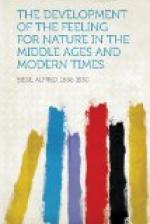Hark! hark! the lark at heaven’s
gate sings,
And Phoebus ’gins arise,
His steeds to water at those springs
On chalic’d flowers that lies;
And winking Mary-buds begin
To ope their golden eyes;
With everything that pretty is,
My lady sweet, arise;
Arise! Arise!
The clearest expression of sympathy for Nature is in Macbeth.
Repeatedly we meet the idea that Nature shudders before the crime, and gives signs of coming disaster.
Macbeth himself says:
Stars,
hide your fires!
Let not light see my black and deep desires;
The eye wink at the hand; yet let that
be
Which the eye fears, when it is done,
to see.
and Lady Macbeth:
... The raven himself is hoarse
That croaks the fatal entrance of Duncan
Under my battlements.... Come, thick night,
And pall thee in the dunnest smoke of hell,
That my keen knife see not the wound it makes,
Nor heaven peep through the blanket of the dark
To cry ’Hold! hold!’...
The peaceful castle to which Duncan comes all unsuspectingly, is in most striking contrast to the fateful tone which pervades the tragedy. Duncan says:
This castle hath a pleasant seat; the
air
Nimbly and sweetly recommends itself
Unto our gentle senses.
and Banquo:
This
guest of summer,
The temple-haunting martlet, does approve
By his loved masonry, that the heaven’s
breath
Smells wooingly here; no jetty, frieze,
Buttress, nor coign of vantage but this
bird
Hath made his pendent bed and procreant
cradle;
Where they most breed and haunt I have
observ’d
The air is delicate.
Perhaps the familiar swallow has never been treated with more discrimination; and at this point of the tale of horror it has the effect of a ray of sunshine in a sky dark with storm clouds.
In Act II. Macbeth describes his own horror and Nature’s:
Now
o’er the one half world
Nature seems dead.... Thou sure and
firm-set earth,
Hear not my steps, which way they walk,
for fear
Thy very stones prate of my whereabouts.
Lady Macbeth says:
It was the owl that shriek’d, the
fatal bellman
Which gives the stern’st good-night.
Lenox describes this night:
The night has been unruly: where
we lay
Our chimneys were blown down; and, as
they say,
Lamentings heard i’ the air; strange
screams of death
And prophesying, with accents terrible,
Of dire combustion and confus’d
events,
New hatch’d to the woeful time:
the obscure bird
Clamour’d the live-long night:
some say, the earth
Was feverish and did shake.
and later on, an old man says:
Three score and ten I can remember well;
Within the volume of which time I have seen
Hours dreadful and things strange; but this sore night
Hath trifled former knowings.




